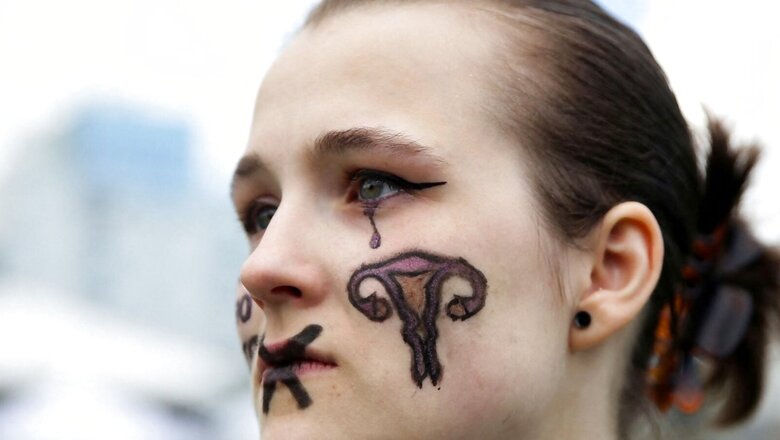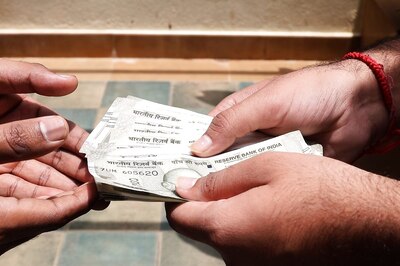
views
After almost 50 years under Roe v. Wade, the US Supreme Court on Friday removed women’s constitutional protections for abortion, a fundamental and very personal change for American lives. The landmark court decision being overturned by the court will probably result in abortion restrictions in around half of US states. The decision, unfathomable only a few years ago, was the result of decades of work by abortion opponents and was made feasible by the court’s right side that had gained strength from three judges appointed by Donald Trump.
More than a month had passed since the shocking leak of a draught opinion by Justice Samuel Alito, which showed the court was ready to make this historic decision. In his final conclusion, Alito argued that the 1992 rulings in Roe v. Wade and Planned Parenthood v. Casey, which upheld the right to an abortion, were incorrect and ought to be overturned.
But what does this mean for women now in the United States? Will the lifting of these protections signify a bigger change on other things – contraceptives, LGBTQA+ rights? News18 explains:
Which States are Heading Towards Abortion Bans Now?
The move will permanently alter how the country views liberty, self-determination, and individual autonomy. States will once again be able to outlaw or severely restrict abortion.
And the race is on. While some states had put in place so-called “trigger” laws to come into force virtually automatically after the decision was handed down. And as of Friday evening, at least seven states had banned the procedure: Alabama, Arkansas, Kentucky, Louisiana, Missouri, Oklahoma, and South Dakota, AFP explained in its report. Some 30 states are expected to comply as soon as is practical, making abortion illegal in most of the South and the Midwest.
What If a Woman from these States Wants an Abortion?
In these states, pregnant women must either travel hundreds of miles to an abortion facility or perform abortions on themselves at home using medication or other methods.
Anti-abortion legislation, however, is not national. Because certain Democratic-led states like California and New York extended reproductive rights in the run-up to the ruling, the US will have a patchwork of laws, containing limitations and protections, according to a report by the Guardian.
Unintended pregnancies and abortions are more common among poor women and women of color, both in the US and around the world.
Research shows that people have abortions whether lawful or not, but in nations where access to abortion is limited or outlawed, women are more likely to suffer negative health outcomes, such as infection, excessive bleeding and uterine perforation. Those who must carry a pregnancy to full term are more likely to suffer pregnancy-related deaths, a report by the Conversation stated.
The state-by-state access to abortion resulting from this decision means many people will have to travel farther to obtain an abortion. And distance will mean fewer people will get abortions, especially lower-income women – a fact the Supreme Court itself recognized in 2016.
Will Abortion Pills be Banned Too?
But since 2020, medication abortion – a two-pill regimen of mifepristone and misoprostol – has been the most common method of ending pregnancy in the U.S. The coronavirus pandemic accelerated this shift, as it drove the Food and Drug Administration to make medication abortions more available by allowing doctors to prescribe the pills through telemedicine and permitting medication to be mailed without in-person consultation.
Many states that restrict access to abortion also are trying to prevent medication abortion. But stopping telehealth providers from mailing pills will be a challenge. Further, because the FDA approved this regimen, states will be contradicting federal law, setting up conflict that may lead to more litigation.
But States May Target Contraceptives
The current Supreme Court may not have the necessary five votes to approve a blanket ban on all forms of contraception, but it may still allow states to outlaw specific types of contraception that many religious conservatives view as being similar to abortion, Vox explained in its report.
In Burwell v. Hobby Lobby (2014), the Supreme Court ruled 5-4 that companies may refuse to provide specific birth control techniques in their employees’ health plans if they had a religious objection. At least some of the plaintiffs in Hobby Lobby asserted that “two types of intrauterine devices” and “two forms of emergency contraception often referred to as ‘morning after’ pills” can result in an abortion because they “may operate after the fertilisation of an egg.”
And LGBTQA+ Rights?
Lesbian, gay, bisexual, transgender, and queer persons would be directly impacted by the high court’s ruling, Cathryn Oakley, an attorney with the Human Rights Campaign, the largest LGBTQ rights organisation in the nation told NBC News.
“The LGBTQ community relies on reproductive health care. LGBTQ people seek and receive abortions, they seek and receive and use contraception,” she said. According to HRC’s study of the 2017-2019 National Survey for Family Growth, lesbians (22.8%) and bisexual women (27.2%) who have been pregnant are more likely than heterosexual women (15.4%) to have undergone an abortion.
According to a 2019 report in the journal BMJ Sexual & Reproductive Health, over a third of transgender people who have been pregnant considered terminating the pregnancy themselves and nearly one in ten of them actually did so due to problems like barriers to abortion access and medical mistreatment.
Some activists worry that the court’s readiness to overturn precedent may indicate that other federally protected minority rights, such as same-sex marriage, which became the rule of the country after the Obergefell v. Hodges case, are in danger, the NBC report states.
Some LGBTQ activists and policymakers believe that Alito’s viewpoint is cause for alarm. Alito, who abstained in the Obergefell decision, has subsequently publicly expressed his disapproval of the important decision.
He bemoaned the fact that it is no longer acceptable to refer to marriage as a “union between one man and one woman” because doing so is now viewed as “bigotry” in a speech he gave to the conservative Federalist Society in November 2020.
Read all the Latest News , Breaking News , watch Top Videos and Live TV here.



















Comments
0 comment